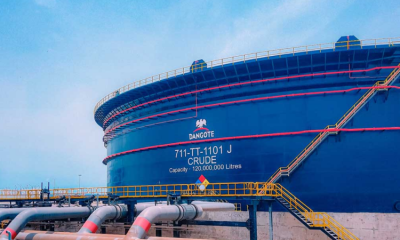
Business
Dangote Refinery To Supply 25M Litres Of PMS Daily

iexclusivenews – In a groundbreaking development that promises to reshape Nigeria’s energy landscape, the Dangote Refinery is poised to flood the market with an astounding 25 million litres of petrol daily, starting this September.
This revelation, made by the Nigerian Midstream and Downstream Petroleum Regulatory Authority (NMDPRA), marks a pivotal moment in the nation’s quest for energy self-sufficiency and economic stability.

The announcement comes on the heels of a crucial meeting between the NMDPRA and the Nigerian National Petroleum Company Limited (NNPCL), where an agreement was reached for the local supply of crude oil to the Dangote Refinery.
This strategic move not only ensures a steady supply of raw materials to the refinery but also strengthens the domestic energy value chain.
According to the NMDPRA’s statement, the initial supply of 25 million litres per day is just the beginning.

The regulatory body revealed plans to ramp up production to an impressive 30 million litres daily from October 2024, signaling a commitment to meeting and potentially exceeding local demand for petroleum products.
Table of Contents
Dangote Refinery: A Vision Realized
The commencement of petrol production at the Dangote Refinery represents the culmination of years of planning, investment, and perseverance.
Aliko Dangote, the visionary behind this $20 billion project, formally announced the start of operations in a live broadcast that captivated the nation.
Expressing his gratitude to President Bola Tinubu for approving the sale of crude oil in naira to local refineries, Dangote acknowledged the skepticism that once surrounded the project.
“Many did not believe that this refinery could become a reality,” he remarked, underscoring the magnitude of the achievement.
Dangote Refinery Impact on Energy Security
The 650,000 barrels per day capacity of the Dangote Refinery positions it as a game-changer not just for Nigeria, but for the entire sub-Saharan African region.
This massive production capability is expected to meet local demands comprehensively while also catering to the needs of neighboring countries.
The refinery’s operation is anticipated to have far-reaching effects on Nigeria’s economy.
By reducing reliance on imported petroleum products, it promises to ease pressure on foreign exchange reserves and potentially stabilize fuel prices in the long term.
Moreover, the creation of thousands of direct and indirect jobs will contribute significantly to Nigeria’s employment landscape.
Challenges and Opportunities Ahead
While the commencement of operations at the Dangote Refinery is undoubtedly a cause for celebration, industry experts caution that challenges remain.
The complex logistics of distributing such large volumes of petrol across the country will require significant upgrades to Nigeria’s transportation and storage infrastructure.
Additionally, the refinery’s impact on existing importers and the downstream sector will need careful management to ensure a smooth transition in the market dynamics.
The government and regulatory bodies are expected to play a crucial role in navigating these changes and ensuring fair competition in the new landscape.
Environmental considerations also come into play, with stakeholders calling for strict adherence to international standards in emissions control and waste management.
The Dangote Group has repeatedly assured the public of its commitment to sustainable practices, but vigilance from regulatory bodies and environmental groups will be essential.
Looking to the Future
The Dangote Refinery’s entry into full-scale production marks the beginning of a new era in Nigeria’s energy sector.
As the nation watches this industrial behemoth ramp up its operations, there is a palpable sense of optimism about the future.
Industry analysts predict that the success of the Dangote Refinery could spark a renaissance in Nigeria’s refining sector, potentially attracting more investments and leading to the rehabilitation of existing refineries.
This could further bolster Nigeria’s position as an energy powerhouse on the African continent.
Moreover, the refinery’s operation is expected to have positive ripple effects across various sectors of the economy.
From petrochemicals to agriculture, the availability of locally refined products could spur growth and innovation in industries that rely heavily on petroleum derivatives.
As Nigeria stands on the cusp of this transformative period, all eyes will be on the Dangote Refinery to deliver on its promises.
The coming months will be crucial in determining how this monumental project shapes the nation’s economic trajectory and energy future.
With the potential to not only meet domestic demand but also to export refined products, the Dangote Refinery stands as a testament to Nigerian ingenuity and entrepreneurship.
As it begins to pump out millions of litres of petrol daily, it carries with it the hopes and aspirations of a nation eager for energy independence and economic prosperity.


























